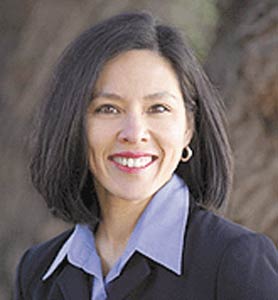Thirsty workers at the county’s water district must bring their
own bottled water or drink tap water after the board of directors
approved a measure banning the purchase of bottled water.
Morgan Hill – Thirsty workers at the county’s water district must bring their own bottled water or drink tap water after the board of directors approved a measure banning the purchase of bottled water.
The Santa Clara Valley Water District’s departments stopped buying bottled water five years ago, according to Water District spokeswoman Susan Siravo, but continued to allow the sale of bottled water in vending machines.
At its Sept. 25 meeting the board voted 5-1 to approve a measure they hope will encourage people to consider the economic and environmental benefits of drinking tap water over bottled water.
“This makes a bigger statement about the use of tap water,” said Water District Board member Rosemary Kamei, who represents South County and who voted in favor of the resolution. “Tap water is good if not better than bottled water and it is regulated for quality,” she said. “That is a factor many people should know.”
The resolution also bans the sale of bottled water at the Water District’s headquarters on Almaden Expressway in San Jose where more than 800 employees work and had been purchasing the water from cafeteria vending machines. The employees will now have to bring their own bottled water to work or drink tap.
Kamei said neither she nor other members of the District Board have received complaints from employees about the new ban.
The lone dissenting vote on the resolution was cast by Board Director Sig Sanchez.
“I think this was an issue of private enterprise versus government,” Sanchez said. “Philosophically, I don’t feel we should be taking those positions even though it may disagree with the activities of a private enterprise,” he said. “That’s not an area where government belongs. Let the market dictate.”
Ram Singh, professor of water resources and engineering at San Jose State University, expressed a qualified approval of the resolution.
“This was a waste of public money,” he said. “I think they have done so many outrageous things and I’m glad they’re finally coming to their senses.”
Singh said he broached the topic of ending district funds for bottled water when he campaigned last year against incumbent Kamei, who holds South County’s District 1 seat. Singh’s criticisms of district over-spending — which extend beyond bottled water and include salaries, board expenses, and other major costs — were echoed by Terry Mahurin, a retired engineer and long-time critic of the Water District Board.
“I was stunned that the water district has allowed any district funds to be (used for) buying bottled water,” Mahurin said, “even if the costs were a drop in the bucket.”
Mahurin said there are many advantages to drinking tap water over bottled water, including cost-effectiveness, safety and the promotion of environmental health.
The environment suffers because the plastic needed to make bottles sucks up valuable fuel and creates stores of waste that cause significant pollution, according to a May 2007 report by the Washington-based Worldwatch Institute.
Mahurin, who sits on a San Martin group overseeing clean-up of polluted groundwater in the area, also said people are mislead into thinking bottled water is safer than tap water.
“Tap water in most of the county is at a very high quality level,” he said.
Still, many people in South Valley prefer bottled water because certain municipal wells in their vicinity have higher than normal concentrations of nitrates and per chlorate, both of which can cause adverse health effects if consumed in high quantity. Nitrates, for example, can cause a blood disorder called methemoglobinemia, also known as blue-baby syndrome because it occurs most commonly in infants and can cause a characteristic blue-gray skin coloration.
Perchlorate, a salt known to cause thyroid dysfunction in high enough counties, has contaminated groundwater in a 10-mile area stretching southeast from Tennant Avenue, in Morgan Hill. The contaminant was a byproduct of decades of road flare manufacturing by Olin Corporation, which is now working with regional water regulators to clean groundwater.
Mahurin doesn’t believe the levels of perchlorate found in South Valley wells are cause for concern.
“Morgan hill went ahead and decided to not take the risk and they began filtering the municipal water to protect against the perchlorate getting into the municipal drinking,” he said.
Kamei said she hopes the new resolution will encourage people to reconsider drinking bottled water over tap water.
“It takes time but it’s all a matter of education,” she said. “Some people will still have a preference for bottle water. They might say I like the taste and convenience. It’s changing what people know and changing their habits. It’s going to take a little while but we’ll see how it goes.”








